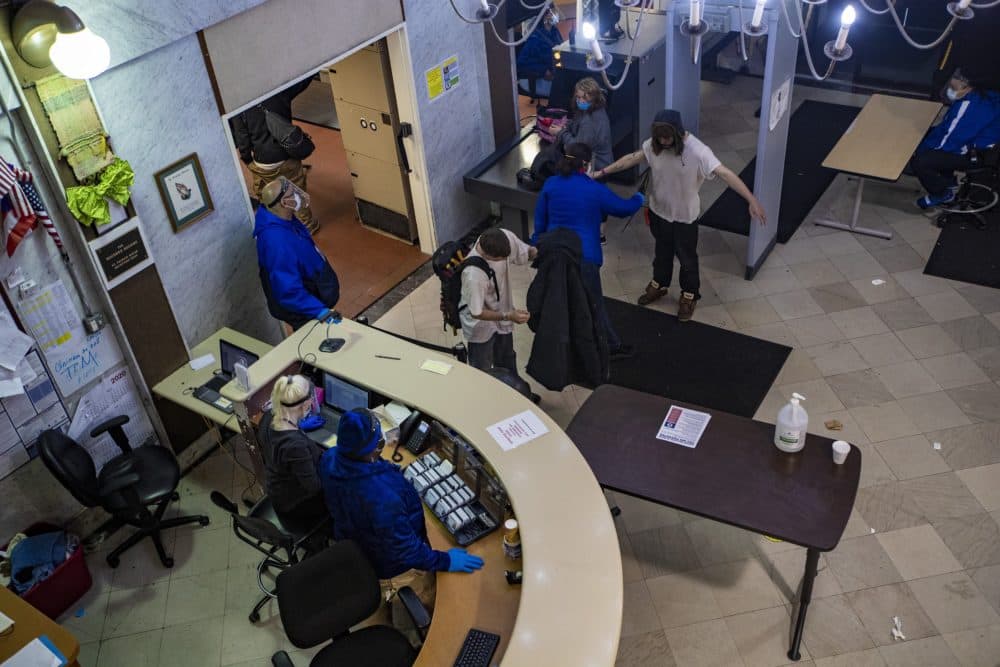Advertisement
Coronavirus Coverage
For Boston Homeless Shelter Workers On The Coronavirus Front Line, Importance Of Universal Testing Gets Personal

Every day, it's the same steady stream at St. Francis House in downtown Boston. Hundreds of people come looking for a boxed meal and an escape from the cold or rain — coronavirus pandemic or not.
Mingling and chatting with them is Angel Marte.
"Our guests, they're just part of the family," Marte says. "They see us like their family members."
Marte is the community engagement and safety manager at St. Francis House. He's one of hundreds of homeless shelter workers who will now be eligible for coronavirus testing, under a plan announced by city officials. The city has secured 1,000 additional coronavirus test kits, and its goal is to test the rest of the homeless population and front-line homeless service workers.
So far more than 1,300 people who are homeless in Boston have been tested. Almost 34% have come up positive for the virus, according to the Boston Public Health Commission.
Marte, 53, supervises a team he describes as the first responders in the shelter. They respond to fights, seizures, overdoses and episodes tied to mental illness. They de-escalate each situation and stabilize people until medical personnel arrive, when necessary.
The work is physical and exhausting to begin with. Now there's the risk of an unpredictable, potentially deadly new virus thrown into the mix. Over the last month or more, Marte says he's had some minor coughs and occasional aches and pains, but nothing that overtly seemed like the coronavirus — though he knows the virus' presentation varies widely.
"It's a little tough on the staff, in particular," Marte says. "I mean, everybody's a little overworked and getting a little tired ... But we're getting through it. And, you know, it's all for the greater good."
Advertisement
They're getting through it with personal protective equipment in short supply. They went through a few weeks of March without masks, until it was clear how serious things were getting. Since then they've had masks and gloves. They didn't have face shields until some were donated this past week.
Marte says this time is especially tough for him because he's an outgoing, "touchy-feely" guy. He says he would normally respond with a hug if a guest reached out for one. Even without hugs, he often has to get close.
"The problem sometimes is that some of our guests are so soft spoken … I need to get closer to hear them, but I don't want to get too close to catch something that they may have or give them something if I may have it," Marte says. "So that's kind of something that I noticed ... like, 'Oh, yeah, I do that a lot. I have to go in. I have to lean in and touch base with people.' "
'Whatever It Takes. Sign Me Up'
St. Francis House President and CEO Karen LaFrazia says she marvels at Marte and the rest of her 50 or so employees, who remain on-site despite fears about their own health.
"There are [employees] that are coming in, and they're working a full shift and then turning around ... when we had to staff a hotel for people that were in quarantine," LaFrazia explains. "So they would work their full shift at St. Francis House, and then they would go to the hotel and work another shift ... get a couple of hours' sleep, and then they'd show back up first thing in the morning to open the doors."

LaFrazia says from the start, the attitude among her employees has been, "Whatever it takes. Sign me up." But after seven or eight weeks of that, people are physically and emotionally drained. So far three of her workers have tested positive for the coronavirus.
And from the beginning, LaFrazia was right in the mix at the shelter — trying to figure out how to make this new normal work. First off, meals were a concern. She knew people could no longer cram into the dining room to eat hot meals. LaFrazia and her staff decided on bagged breakfast and lunches — things like sandwiches people could take to different locations around the facility to spread out. She assigned case workers to become kitchen workers, to make the new meal logistics possible.
She's managing staffers who are trying to get people out of shelter and into some sort — any sort — of housing. The pandemic has made that even more important, and even more difficult.
A Turn For The Worse, Times Two
About a month into the ordeal, things got more complicated for LaFrazia personally. She started getting a sore throat, runny nose and headache. She says she never had a fever. Because of her line of work, her doctor arranged for her to get tested for the coronavirus.
She found out on Easter Sunday she had COVID-19.
"I isolated at home. But, you know, [you have] one bathroom, a husband, two kids. You're doing the best that you can," LaFrazia says. She says her symptoms weren’t serious enough to prevent her from working while in isolation.
So she managed St. Francis House from afar. Things then quickly took a turn for the worse — though not for her health.
"I think about a week later, my daughter started developing mild allergy-like symptoms," LaFrazia says. "And then … last Sunday, she spiked a 106 fever."
Her daughter is 15 years old and otherwise healthy. They rushed to the hospital, where doctors brought down the teen's fever. But they didn't test her for the coronavirus, because they didn't see the need to admit her at that point, LaFrazia says. They sent her home.

On Thursday, LaFrazia described what happened with her daughter over the past week.
"She got more sick — coughing and headache, and just a whole bunch of … symptoms that people are getting with COVID. And then Tuesday night, she really couldn't breathe," LaFrazia says. "And so we were back in the car, back to the emergency room."
Her daughter was admitted to Boston Children's Hospital, where doctors confirmed she has COVID-19, with the complication of pneumonia. She's been receiving oxygen through her nose, along with IV fluids.
So LaFrazia is not at St. Francis House, or even focused on the operations of the shelter. She's focused on her daughter. She's done with her own quarantine based on when her symptoms started, which has allowed LaFrazia to stay by her daughter's bedside in the hospital day and night.
“She's going to be fine. I am sure of it," LaFrazia says. "She's getting the best care. She's a good patient. But ... you know, as a mother, you're scared."
Testing A Crucial Tool
The need for coronavirus testing among homeless shelter workers became personal very quickly, LaFrazia says. She says she commends city and public health leaders, as well as homeless service providers in Boston, for seeing to it that the entire homeless population — and people who work with those who are homeless — will be tested.
The urgency hit her in a conversation with her son, during a stop home from being with her daughter at the hospital.
"He asked me ... 'Mom, are you going back to work after this?' And I was like, 'Yeah, of course I am," LaFrazia says.
Her son indicated he was worried about the whole family's well-being.
"[He said], 'I don't know if I feel safe with you coming home. I love you. And I'm proud of you for taking care of the homeless. But I don't know if it's a good idea for you to come home, and maybe you should stay somewhere else,' " LaFrazia says.
She says she could sense her son's anxiety and fear. She's considering his idea.
But she's also worried about the employees she's left behind at St. Francis House.
Universal testing will likely mean some of them, even those without symptoms, will have to stay home in isolation, because they'll learn they have the coronavirus — another challenge for an already stressed team.
But, LaFrazia says, it's the only way to begin to assure that a vulnerable population and the people who serve them will be safe.
This segment aired on April 24, 2020.
